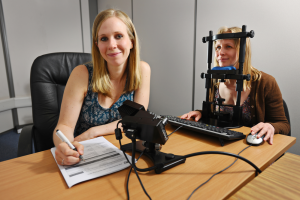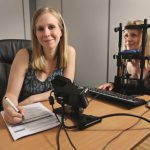
“The entrepreneur always searches for change, responds to it, and exploits it as an opportunity.” – Peter Drucker[1]
What’s your job? is a question I’m regularly asked by family and friends. For me, one of the easiest ways to explain this is to use some of the research and project collaborations I have the chance to be involved within my role at the university; as examples.
Managing the Higher Education Innovation Fund (HEIF) portfolio at BU means I have the chance to work with many innovative and sometimes “quirky” projects. HEIF whilst not the only fund that encourages innovation and knowledge exchange often provides funding where there may not be such a natural fit from some of the more traditional funding sources. Many project teams use HEIF to leverage further research and grant opportunities, having developed relationships and networks with organisations as part of their HEIF project.
Research into Prosopagnosia (Face Blindness) formed part of Dr Sarah Bate’s early years as both a student and academic. Funded by the ESRC and MRC Sarah’s doctoral research examined eye – movement strategies in people with prosopagnosia.(2009)
Much of Sarah’s work examines the nature of face-processing difficulties in both adults and children, with a particular focus on ‘prosopagnosia’ or ‘face blindness’, where people cannot recognise others from their faces alone. Including a Roundtable discussion in the House of Commons, development in this area of research subsequently informed policy with the NHS recognising this as a condition – NHS Choices Website.(2014)
Sarah’s more recent research has progressed to the other end of the facial recognition spectrum moving from prosopagnosia, the inability to recognise familiar faces, to super-recognisers who have exceptional face processing skills.
In 2009, the first report of people with extraordinary face recognition skills (so-called “super-recognisers”) was published, followed by a further investigation in 2012. Both papers examined the performance of super-recognisers on laboratory-based tasks, using tests that are typically used to assess those with prosopagnosia.
These so-called “super-recognisers” may be of particular use in policing and national security settings, such as passport control or when hunting for a wanted or missing person. The lab at BU is now developing a specific line of expertise in forensic face recognition. Funding from HEIF has helped with this development. (2015 – 2017.) Collaborations with organisations such as the police have progressed from local to national and international relationships, in addition to the security agencies.
Being agile and adaptable to look at different funding opportunities and changes within the external environment has provided Sarah with the opportunity to consider how her research can make an impact beyond the NHS as her research goes form strength to strength to address the practical applications and need, utilising super-recognisers for policing and border control.
————————–
[1] https://www.virgin.com/richard-branson/my-top-10-quotes-on-opportunity
 From face blindness to super-recognisers: how research is changing lives
From face blindness to super-recognisers: how research is changing lives










 Conversation article: Why so many people drown at the water’s edge
Conversation article: Why so many people drown at the water’s edge Workshop on longitudinal studies in three countries
Workshop on longitudinal studies in three countries New Bournemouth University public health paper
New Bournemouth University public health paper New ACORN-funded paper published. When time is short but passion for food is strong, food day-tripping may be the answer!
New ACORN-funded paper published. When time is short but passion for food is strong, food day-tripping may be the answer! Royal Society of Chemistry Outreach Fund: Open for Applications
Royal Society of Chemistry Outreach Fund: Open for Applications Last reminder – MSCA Postdoctoral Fellowships 2024 internal deadline next week
Last reminder – MSCA Postdoctoral Fellowships 2024 internal deadline next week Horizon Europe – EuroHPC and MSCA PF webinars
Horizon Europe – EuroHPC and MSCA PF webinars